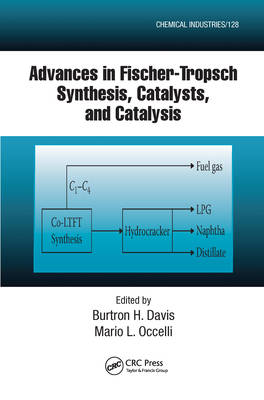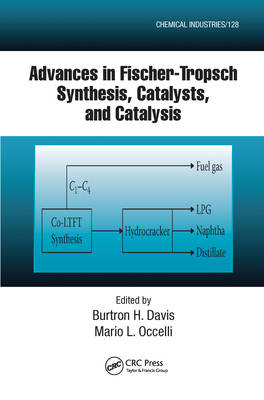
- Afhalen na 1 uur in een winkel met voorraad
- Gratis thuislevering in België vanaf € 30
- Ruim aanbod met 7 miljoen producten
- Afhalen na 1 uur in een winkel met voorraad
- Gratis thuislevering in België vanaf € 30
- Ruim aanbod met 7 miljoen producten
Advances in Fischer-Tropsch Synthesis, Catalysts, and Catalysis
Omschrijving
Rising oil costs have stimulated significant interest in the Fischer-Tropsch synthesis (FTS) as a method for producing a synthetic petroleum substitute. Drawn from the proceedings at a symposium held during the 236th meeting of the American Chemical Society in Philadelphia in August 2008, Advances in Fischer-Tropsch Synthesis, Catalysts, and Catalysis explores the recent developments in Fischer-Tropsch technology, which holds great promise in the area of renewable resources.
Expert contributors explore a range of issues
The book focuses on three main themes: catalyst preparation and activation, reaction mechanism, and process-related topics. A panel of expert contributors discusses synthesis of catalysts, carbon nanomaterials, nitric oxide calcinations, the influence of carbon, catalytic performance issues, chelating agents, and Cu and alkali promoters. They also explore Co/silica catalysts, thermodynamic control, the Two Alpha model, co-feeding experiments, internal diffusion limitations, Fe-LTFT selectivity, and the effect of co-fed water. Lastly, the book examines cross-flow filtration, kinetic studies, reduction of CO2 emissions, syncrude, and low-temperature water-gas shift.
Attaining the maximum catalytic activity and catalyst life
The themes explored in the book demonstrate that while the Fischer-Tropsch synthesis (FTS) has advanced in maturity, many issues remain concerning the preparation of increasingly active catalysts and the method of activation to attain the maximum catalytic activity and catalyst life. The book includes coverage of the structural features, their changes, and the application of increasingly sophisticated characterization techniques, shedding light on the reaction mechanism and providing a glimpse into the processes and reaction rates under realistic commercial process conditions.
Specificaties
Betrokkenen
- Uitgeverij:
Inhoud
- Aantal bladzijden:
- 428
- Taal:
- Engels
- Reeks:
Eigenschappen
- Productcode (EAN):
- 9780367577230
- Verschijningsdatum:
- 30/06/2020
- Uitvoering:
- Paperback
- Formaat:
- Trade paperback (VS)
- Afmetingen:
- 152 mm x 229 mm
- Gewicht:
- 698 g

Alleen bij Standaard Boekhandel
Beoordelingen
We publiceren alleen reviews die voldoen aan de voorwaarden voor reviews. Bekijk onze voorwaarden voor reviews.










